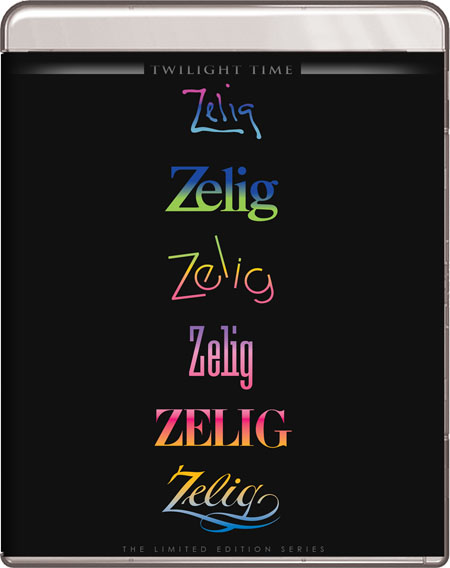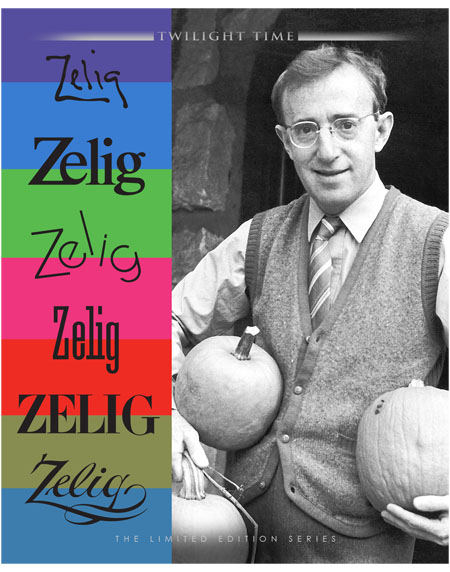
“DOING THE CHAMELEONâ€
By Raymond Benson
Wikipedia
defines “mockumentary†as a portmanteau (a linguistic blending of two words) of
the words mock and documentary. Essentially, it’s a phony,
comic documentary. Woody Allen didn’t invent this sub-genre of the comedy
motion picture, but he delivered two of its more successful examples—his very
first directorial feature, Take the Money
and Run (1969), and Zelig, released
in 1983. The latter can safely be counted as among the writer/director/actor’s best
movies—and seeing that to date he has directed forty-six titles (and that’s not
counting pictures he wrote but didn’t direct), that’s saying a lot.
Zelig, which takes place
in the late 1920s to the early 30s, is
the story of Leonard Zelig (Allen), a “chameleon man,†a nobody who
inexplicably assumes the physical and aural characteristics of whoever he’s
with. If he’s around scientists, he begins to speak the lingo and carry himself
in an academic, erudite fashion; if he’s associating with Chinese folks, he turns
Chinese, facial features included; and if he’s around African-Americans, his
skin darkens. No one can figure out why this marvel occurs.
Before
he knows it, Zelig becomes an international personality. The newsreels “of the
day†are full of him as he rubs elbows with the contemporary rich and famous like
F. Scott Fitzgerald or Jack Dempsey or even Adolf Hitler (all of whom appear in
some way in the remarkable footage on display in this picture). As it was the
“jazz age,†Leonard Zelig’s strange ability is celebrated in popular songs,
dance crazes (everybody is “Doing the Chameleonâ€!), and merchandise befitting
the lizard-like misfit.
Allen
and his cinematographer, Gordon Willis (who was nominated for an Academy Award
for the first time, unbelievably, for Zelig
after acting as DP for such titles as The
Godfather, The Godfather Part II,
All the President’s Men, Annie Hall, and Manhattan, among many others) painstakingly inserted Woody Allen
into frames of black and white still photographs and old newsreels—Forrest Gump-style, but without the
benefit of CGI—to accomplish the amazing visual treatment for Zelig. The look of the film is simply
remarkable, and totally believable, even more so than in Gump.

Additionally,
color footage features 1983-era intellectual luminaries, such as Susan Sontag,
Saul Bellow, and Irving Howe, providing “interviews†and commenting on the
Leonard Zelig phenomenon as if it had really occurred.
The
only other star of note besides Allen is Mia Farrow, who plays a psychiatrist
who attempts to treat the “chameleon man.†Of course, Zelig and his doctor fall
in love—it wouldn’t be a Woody Allen romantic comedy without the romance. It’s
interesting to note that Allen actually started filming Zelig after Stardust Memories
(1980) and it was the first of twelve films he made with Farrow. However,
the visual effects took so much longer to achieve after principle photography
was shot, that Allen wrote, directed, and released A Midsummer Night’s Sex Comedy (1982) before Zelig was completed.
Narrated
by Patrick Horgan, a British actor with a voice that sounds astonishingly like
one of those war-era documentarians, Zelig
is a top-notch, sophisticated, and very funny comedy that is brilliantly photographed and directed.
It was well-received at the time, and it launched Allen into a very successful
run of several financially and critically-acclaimed pictures in the mid-1980s.
And, as with all of the writer/director’s films, it helps if the audience knows
a little bit about history, art, and literature—Woody Allen’s movies, then and
now, are intended for a cultured crowd.
Twilight
Time’s Blu-ray edition looks terrific—and you can’t complain about the
artifacts and blemishes in the images because these were all intentional to
make the old newsreel footage that much more believable. The disk comes with an
isolated score track (and the “original†20s-era music, adapted by Dick Hyman,
is hilarious and dead-on), and the theatrical trailer. A collector's booklet with extensive liner notes by Julie Kirgo about the making of the film is also included.
You,
too, will be singing along with “You May Be Six People, But I Love You.†Limited
to only 3000 copies, Zelig is a
must-grab for Woody Allen fans.
CLICK HERE TO ORDER
